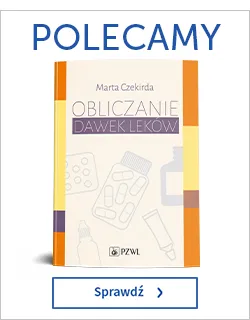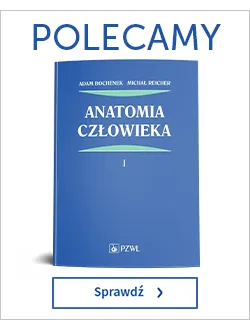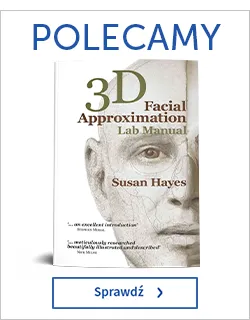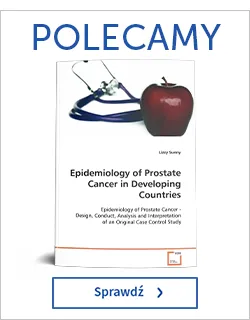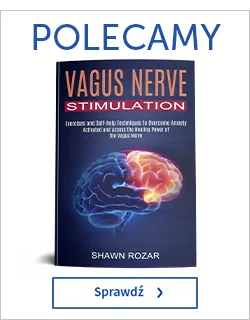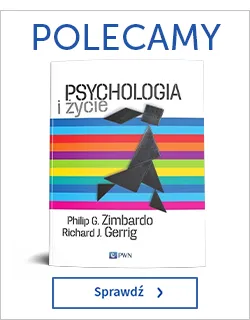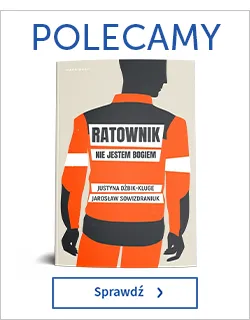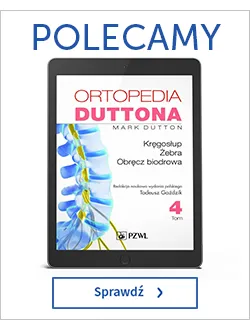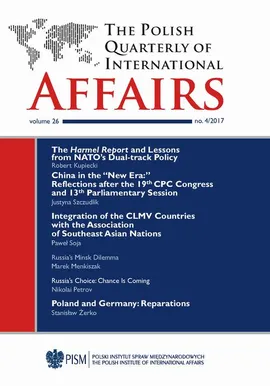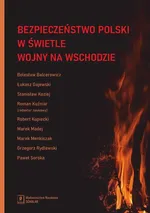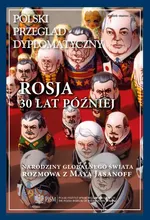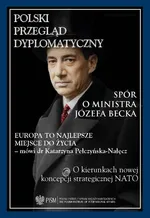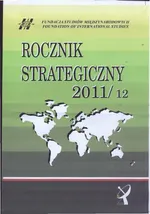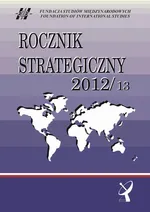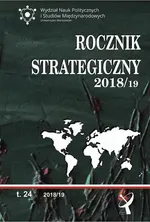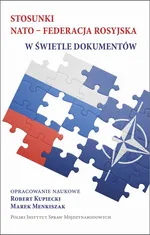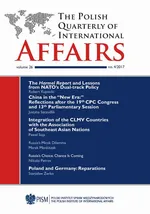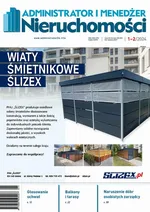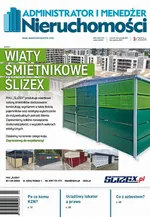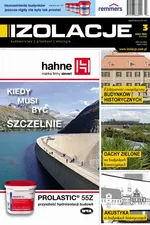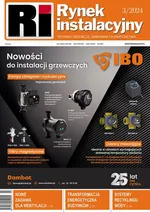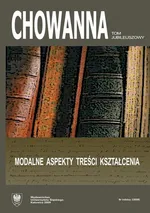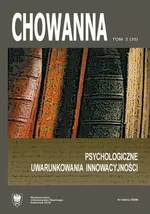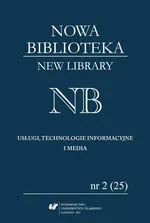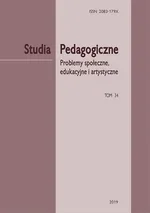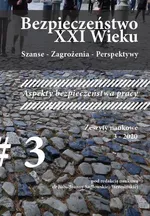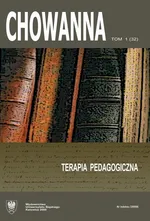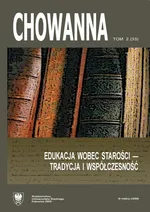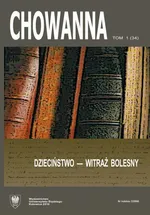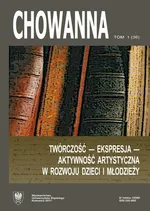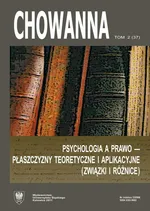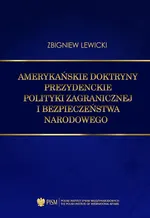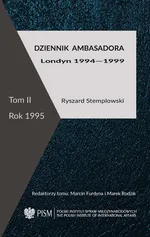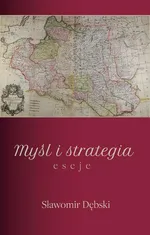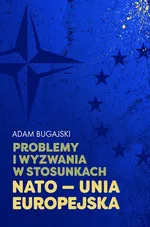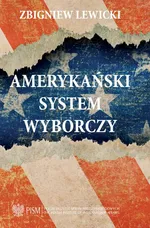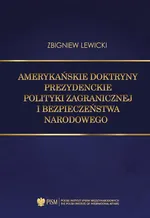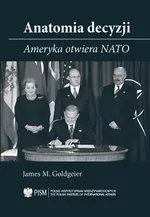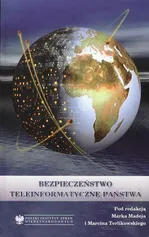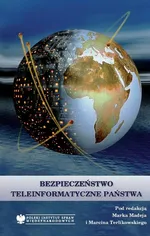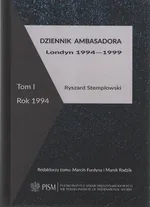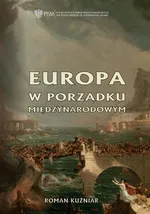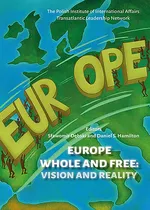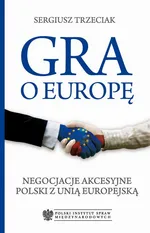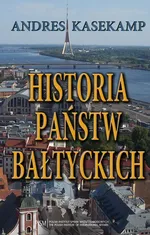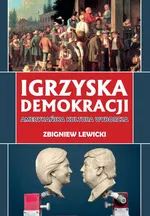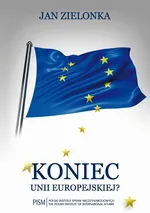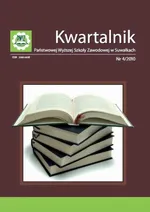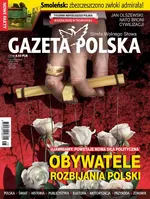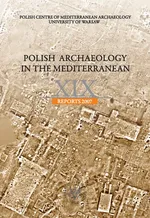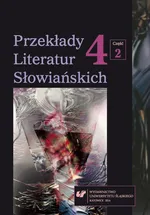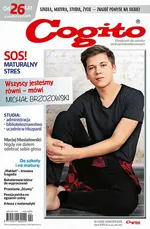- Kategorie:
- Język wydania: ??angielski_pl_PL??
- ISSN: 1230-4999
-
Sposób dostarczenia produktu elektronicznegoProdukty elektroniczne takie jak Ebooki czy Audiobooki są udostępniane online po uprzednim opłaceniu (PayU, BLIK) na stronie Twoje konto > Biblioteka.Pliki można pobrać zazwyczaj w ciągu kilku-kilkunastu minut po uzyskaniu poprawnej autoryzacji płatności, choć w przypadku niektórych publikacji elektronicznych czas oczekiwania może być nieco dłuższy.Sprzedaż terytorialna towarów elektronicznych jest regulowana wyłącznie ograniczeniami terytorialnymi licencji konkretnych produktów.
-
Ważne informacje techniczne
-
Minimalne wymagania sprzętowe:
- procesor: architektura x86 1GHz lub odpowiedniki w pozostałych architekturach
- Pamięć operacyjna: 512MB
- Monitor i karta graficzna: zgodny ze standardem XGA, minimalna rozdzielczość 1024x768 16bit
- Dysk twardy: dowolny obsługujący system operacyjny z minimalnie 100MB wolnego miejsca
- Mysz lub inny manipulator + klawiatura
- Karta sieciowa/modem: umożliwiająca dostęp do sieci Internet z prędkością 512kb/s
-
Minimalne wymagania oprogramowania:
- System Operacyjny: System MS Windows 95 i wyżej, Linux z X.ORG, MacOS 9 lub wyżej, najnowsze systemy mobilne: Android, iPhone, SymbianOS, Windows Mobile
- Przeglądarka internetowa: Internet Explorer 7 lub wyżej, Opera 9 i wyżej, FireFox 2 i wyżej, Chrome 1.0 i wyżej, Safari 5
- Przeglądarka z obsługą ciasteczek i włączoną obsługą JavaScript
- Zalecany plugin Flash Player w wersji 10.0 lub wyżej.
-
Informacja o formatach plików:
- PDF - format polecany do czytania na laptopach oraz komputerach stacjonarnych.
- EPUB - format pliku, który umożliwia czytanie książek elektronicznych na urządzeniach z mniejszymi ekranami (np. e-czytnik lub smartfon), dając możliwość dopasowania tekstu do wielkości urządzenia i preferencji użytkownika.
- MOBI - format zapisu firmy Mobipocket, który można pobrać na dowolne urządzenie elektroniczne (np.e-czytnik Kindle) z zainstalowanym programem (np. MobiPocket Reader) pozwalającym czytać pliki MOBI.
- Audiobooki w formacie MP3 - format pliku, przeznaczony do odsłuchu nagrań audio.
-
Rodzaje zabezpieczeń plików:
- Watermark - (znak wodny) to zaszyfrowana informacja o użytkowniku, który zakupił produkt. Dzięki temu łatwo jest zidentyfikować użytkownika, który rozpowszechnił produkt w sposób niezgodny z prawem.
- Brak zabezpieczenia - część oferowanych w naszym sklepie plików nie posiada zabezpieczeń. Zazwyczaj tego typu pliki można pobierać ograniczoną ilość razy, określaną przez dostawcę publikacji elektronicznych. W przypadku zbyt dużej ilości pobrań plików na stronie WWW pojawia się stosowny komunikat.
The Polish Quarterly of International Affairs 4/2017 - Realism, Idealism, Diplomacy: In Defence of President Woodrow Wilson
(ePrasa)-
Druk: Warszawa, 2017
-
Wydanie/Copyright: wyd. 4
-
Autor: Hieronim Grala, Justyna Szczudlik, Marek Kornat, Marek Menkiszak, Nikolai Petrov, Paweł Soja, Robert Kupiecki, Stanisław Żerko
-
Wydawca: Polski Instytut Spraw Międzynarodowych
-
Formaty:
PDF (Watermark)WatermarkZnak wodny czyli Watermark to zaszyfrowana informacja o użytkowniku, który zakupił produkt. Dzięki temu łatwo jest zidentyfikować użytkownika, który rozpowszechnił produkt w sposób niezgodny z prawem. Ten rodzaj zabezpieczenia jest zdecydowanie najbardziej przyjazny dla użytkownika, ponieważ aby otworzyć książkę zabezpieczoną Watermarkiem nie jest potrzebne konto Adobe ID oraz autoryzacja urządzenia.
Produkt niedostępny
Dodaj do schowka
The Polish Quarterly of International Affairs 4/2017 - Realism, Idealism, Diplomacy: In Defence of President Woodrow Wilson
„The Polish Quarterly of International Affairs” jest anglojęzycznym kwartalnikiem Instytutu poruszającym i analizującym kwestie istotne dla Europy Środkowej i Wschodniej. Stanowi forum debat nad współczesnymi wydarzeniami międzynarodowymi. Każde wydanie zawiera zbiór autorskich artykułów poddanych ocenie peer review, a także recenzje specjalistycznych publikacji. The Polish Quarterly of International Affairs is the Institute’s English language journal and has a Central and Eastern European focus. It provides a forum for the analysis and debate of international affairs through a collection of original, peer reviewed articles on a contemporary theme.
Articles Robert Kupiecki The Harmel Report and Lessons from NATO’s Dual-track Policy (s. 5) The Harmel Report constituted a genuine breakthrough in NATO’s strategic position on the Soviet Union and the author of the text presents its history as well as consequences. Justyna Szczudlik China in the “New Era:” Reflections after the 19th CPC Congress and 13th Parliamentary Session (s. 19) The 19th Congress of the Chinese Communist Party marked the completion of the first term of the fifth generation of leaders. Xi Jinping announced that China entered “a new era of socialism with Chinese characteristics,” which is a new slogan, a symbol of Xi’s second term. Contrary to some expectations, the Congress was not a political breakthrough, as the party’s goals—to hold its power, maintain stability in the country and regain a superpower status—remain unchanged. New means of achieving these goals will be employed, however, including new technologies in economic and social management, while in foreign policy China will be more active globally, proposing or even exporting solutions based on Chinese standards. Paweł Soja Integration of the CLMV Countries with the Association of Southeast Asian Nations (s. 44) This year, the Association of Southeast Asian Nations (ASEAN) celebrates the 50th anniversary of the signing of the Bangkok Declaration. The jubilee is an opportunity to sum up the organisation’s achievements and draft plans for future development. This article aims at analysing integration within ASEAN from the perspective of the CLMV states (Cambodia, Laos, Myanmar, Vietnam) as the newest members of the community. The research focusses on whether or not it is justified to perceive ASEAN as a “two-tier organisation” and if developmental differences between the two groups of members exert a significant influence on the efficiency of the integration process. The integration in examined in three crucial aspects compatible with ASEAN’s three-pillar division: politics and security, the economy and socio-cultural cooperation. Marek Menkiszak Russia’s Minsk Dilemma (s. 70) The essay examines Russia’s dillemmas with the Minsk Agreements three years after the signing of Minsk II, which defined grounds for putting an end to the conflict in much greater detail than the Minsk I Agreement of September 2014. The conflict was to end with a ceasefire, followed by a withdrawal of heavy weapons on both sides, an exchange of and amnesty for all hostages, democratic elections held in the occupied areas of Donbas and its reintegration with Ukraine. This would result in the region’s special status and restoration of Ukrainian control over the entire Russo-Ukrainian border in the east of Ukraine, but so far no provision of this 13-point plan has been implemented in full. Nikolai Petrov Russia’s Choice: Change Is Coming (s. 86) The article outlines some socio-political phenomena and trends observed in Russia at the regional as well as federal level. The author concludes that a wise government should conform to objective laws of societal growth, such as the swinging of the pendulum from the centre to the regions, in order to reap maximum benefits from the position it finds itself in. Stanisław Żerko Poland and Germany: Reparations (s. 96) Poland, a key victim of Nazi Germany’s aggression, never received adequate compensation for the destruction of the country during World War II. The author explains why this was the case and presents the history of this crucial issue in Polish-German relations. Marek Kornat Realism, Idealism, Diplomacy: In Defence of President Woodrow Wilson (s. 108) The study is devoted to Woodrow Wilson’s conceptions of international peace. The author rejects the popular perception of the American president as a political idealist, who contributed to the highly unstable peace of Versailles. Geopolitical revolution in East Central Europe was unavoidable and the restoration of international equilibrium seemed impossible, while the League of Nations without the U.S. was ineffective. Wilson’s tried to modernise international relations and the Versailles order offered many stateless nations between Russia and Germany an opportunity for development and modernisation. Hieronim Grala Was the Polish-Lithuanian Commonwealth a Colonial State? (s. 125) Some recent trendy theories attempt to describe relations within the Polish-Lithuanian Commonwealth as a form of colonialism, and the author rejects these allegations, depicting them as ahistorical. Annual list of contents (s. 151)
-
Inne autora
-
Inne z kategorii
-
Inne wydawcy
Inni Klienci oglądali również
Kwartalnik Państwowej Wyższej Szkoły Zawodowej w Suwałkach nr 4/2010
Kwartalnik nr 4/2010 jest zbiorem artykułów poświęconych tematyce budownictwa, ze szczególnym zwróceniem uwagi na problematykę: wykorzystywania termowizji w budownictwie, eksploatację budynków oraz racjonalizacji użytkowani...
Gazeta Polska 12/07/2017
Prawicowo-konserwatywny tygodnik poruszające trudne tematy związane z historycznymi oraz bieżącymi wydarzeniami społecznymi, gospodarczymi i politycznych. Wydawnictwo ukazujące nieprawidłowości we wszystkich sferach życia publicznego.
Polish Archaeology in the Mediterranean 19
Wydawany regularnie od 1990 roku rocznik (od tomu VII wyłącznie po angielsku) jest zapisem bieżących prac wykopaliskowych prowadzonych przez misje Centrum Archeologii Śródziemnomorskiej UW w kilku krajach północno-wschodniej Afryki i Blis...
Przekłady Literatur Słowiańskich. T. 4. Cz. 2: Bibliografia przekładów literatur słowiańskich (2007-2012)
„Przekłady Literatur Słowiańskich”. T. 4, cz. 2 pt. Bibliografia przekładów literatur słowiańskich (2007-2012) odnotowuje tłumaczenia z pięciu lat literatur bułgarskiej, chorwackiej, czeskiej, macedońskiej, serbskiej, słowackiej i sł...
Rynek Instalacyjny 5/2017
W numerze m.in.: ● Wykorzystanie wody deszczowej,● Oddymianie klatek i wentylacja garaży,● Klimatyzatory – nowości i innowacje.
Cogito 4/2020
Wyzwaniem XXI wieku jest nietolerancja” – wywiad z megazdolnym artystą, Michałem BrzozowskimLicealistki z Poznania na froncie z rakiem – reportaż o wyjątkowym projekciePrzedmaturalne ataki paniki i pustka w gło...
Recenzje
Nikt nie dodał jeszcze recenzji. Bądź pierwszy!
Zgłoś nadużycie

